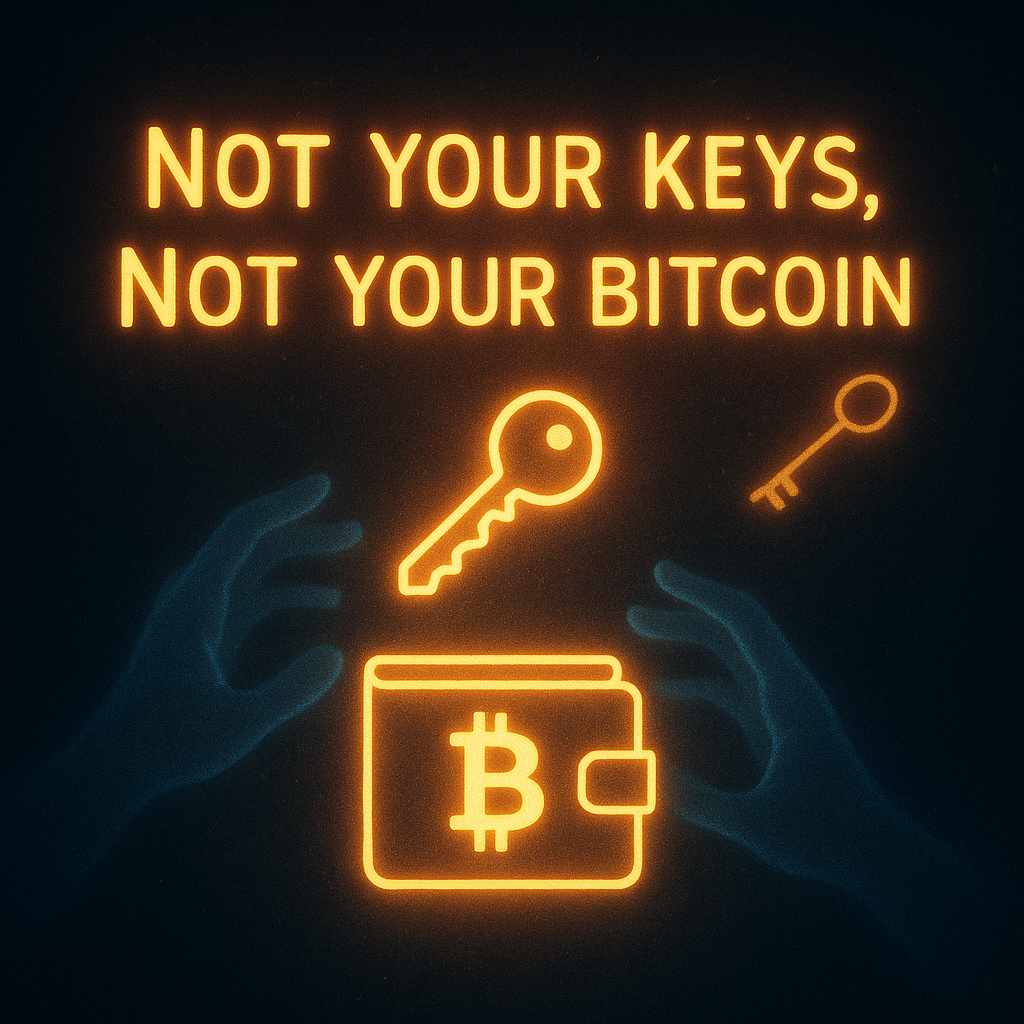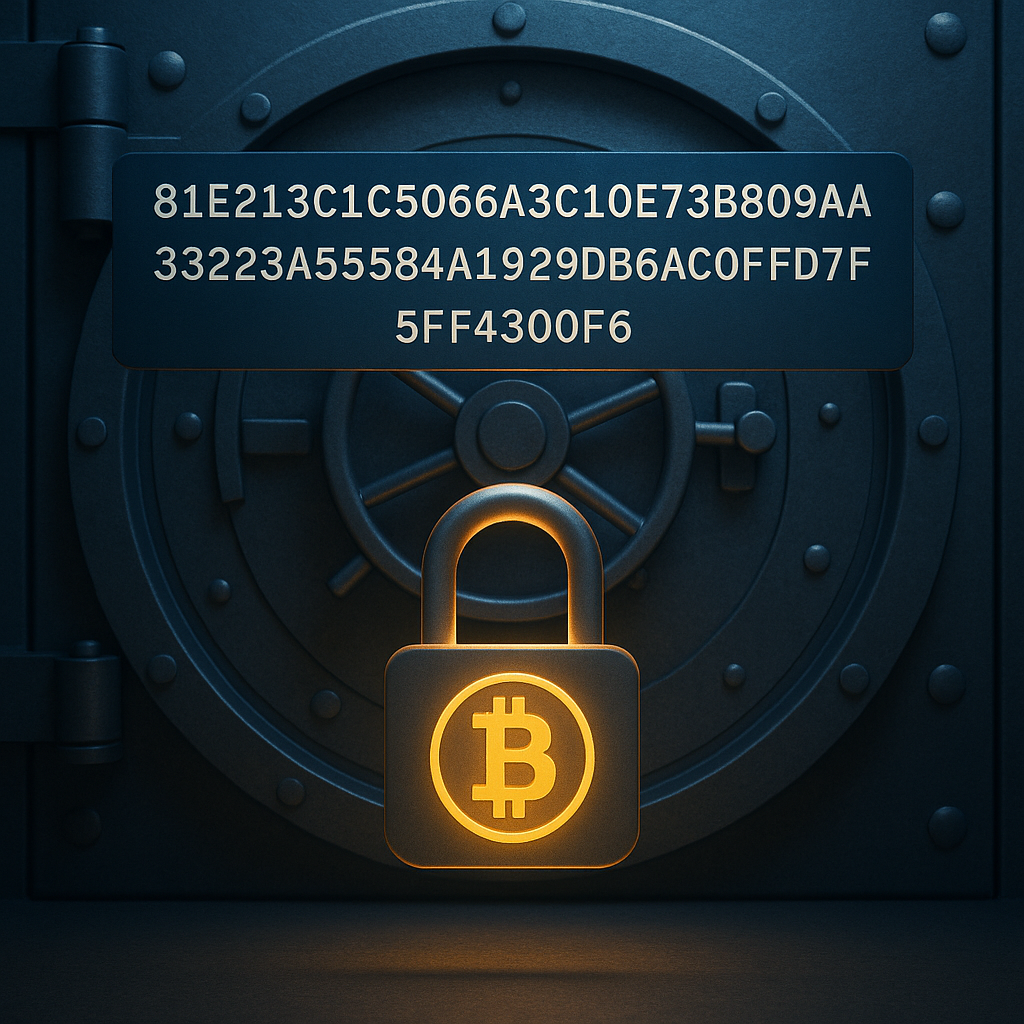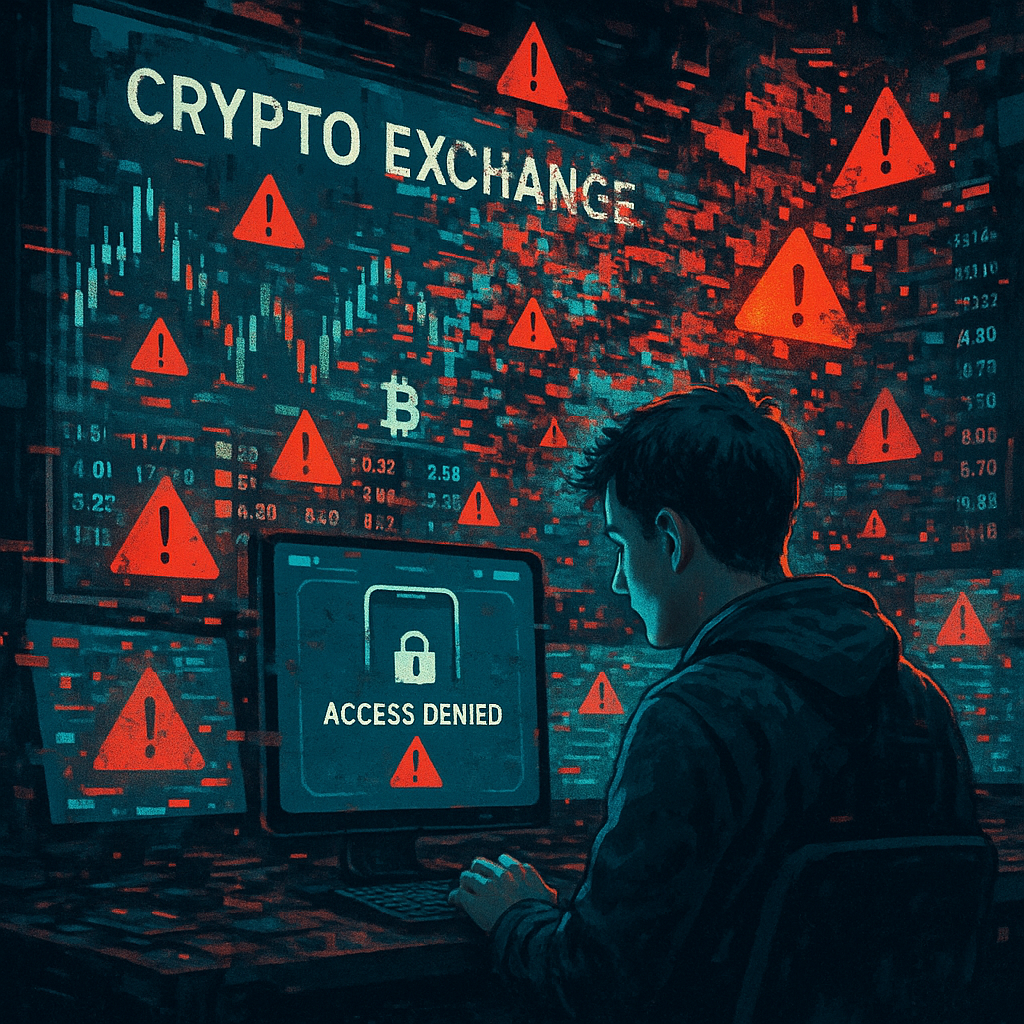What Does “Not Your Keys, Not Your Bitcoin” Really Mean?
In the world of Bitcoin, a popular phrase echoes across cyberspace: “Not Your Keys, Not Your Bitcoin.” What does it mean? Well, friend, let’s unravel this cryptic message together.

At its core, this adage underscores the crucial concept of Bitcoin ownership. This idea isn’t about physically owning a piece of shiny metal or a crisp bill—it’s about commanding an ethereal string of code known as a Bitcoin private key.
In this digital world, your private key serves as your exclusive access to your Bitcoin. Your private key serves as an invincible bank vault, securely storing your Bitcoin.
At its core, this adage underscores the crucial concept of Bitcoin ownership. This idea isn’t about physically owning a piece of shiny metal or a crisp bill—it’s about commanding an ethereal string of code known as a Bitcoin private key.
Not Your Keys, Not Your Bitcoin: Why Self-Custody Matters
In this digital world, your private key serves as your exclusive access to your Bitcoin. Think of it as an invincible bank vault, securely storing your Bitcoin—completely under your control.
Lose that key, and you’ve essentially lost your bitcoin—hence the expression: “Not Your Keys, Not Your Bitcoin.” It’s a stark reminder that if you don’t control your keys directly, you can’t fully claim those Bitcoin as yours.
Now, you might wonder why anyone would want to take on such grave responsibility when they could just entrust their keys to someone else—like a Bitcoin exchange?
Ah! Therein lies the next point: the risks of custodial wallets and exchanges. While they offer convenience with sleek interfaces and quick access, they also represent a massive security trade-off.
These platforms are prime targets for hackers, cyber pirates eager to seize your sovereign money. And these aren’t just theoretical dangers—history is full of real breaches and lost fortunes from users who trusted exchanges to hold their Bitcoin.
So how do you navigate this landscape safely? By embracing the concept of Bitcoin self-custody—a bold step that puts you in charge of your financial destiny.
Managing your own private keys through a non-custodial wallet (like a solid hardware wallet) helps you bypass the risks of third-party custodians entirely. But be warned: with great power comes great responsibility.
That means keeping your private key and backing up your seed phrase (the 12 or 24-word recovery phrase) in a safe, secure way. Think of it as the backup plan to your bank vault.
This is the heart of the lesson: taking control of your Bitcoin means securing it yourself. Choosing a non-custodial wallet and protecting your seed phrase is your rite of passage into true Bitcoin ownership—like a knight guarding their treasure.
Welcome to the universe of Bitcoin—where you really own your money, if you’re savvy enough to hold your keys.
Private Keys: The Foundation of True Bitcoin Ownership
Picture your Bitcoin hardware wallet as the vault in which you store your precious digital gold. Now, fittingly, the private key represents the unique code that will unlock this vault. It’s a complex string of alphanumeric characters, and that’s what gives you full access to and control over your Bitcoin holdings.
So in essence, if you have the private key to a Bitcoin address, you own the Bitcoin associated with that address. This situation is where that popular axiom among crypto enthusiasts rings true: “Not Your Keys, Not Your Bitcoin.”
Without those keys under your control, technically speaking—and bluntly put, you’re not really the one holding those bitcoins. This scenario leads us to ponder how to store Bitcoin safely.
Many newcomers venture into cryptocurrency through exchanges or custodial wallets without realizing they are giving up control of their private keys. They may seem like a convenient option because they manage your private keys for you, but know this: they also hold onto them tightly.

What Does It Mean to Truly Own Your Bitcoin?
Custodial platforms introduce a serious vulnerability: third-party risk. If these services get hacked or shut down, your Bitcoin goes with them. That’s why we need to talk about what real Bitcoin ownership actually looks like.
In contrast to custodial options, non-custodial wallets let you hold your private keys. This enables what we call Bitcoin self-custody—the foundation of self-sovereign money: money controlled by its owner, not an institution.
Yes, managing your own keys might feel intimidating at first—but it’s essential. With self-custody, you decide where your Bitcoin is stored, who can access it, and how it’s recovered. And just as important: you protect your seed phrase—the list of words that can recover your wallet if something happens to your device.
True Bitcoin ownership means embracing a few key concepts:
- Bitcoin hardware wallets for offline storage
- Private key control to eliminate third-party risk
- Seed phrase security to safeguard your recovery method
It takes some learning—but with focus and intention, it’s absolutely doable. And it’s worth it. Because in the world of Bitcoin, knowledge truly is power.
After all, you’re taking control of the financial reins—and that’s what Bitcoin was built for.
The Risks of Custodial Wallets and Exchanges
Ah, the convenience of custodial wallets and exchanges. They handle all the hard and technical parts of Bitcoin ownership for you. It’s like a bank for your digital assets, right?
This is where the adage “Not Your Keys, Not Your Bitcoin” becomes relevant. This concept essentially means that if you don’t possess the private keys to your Bitcoin wallet, then you don’t truly own the Bitcoin within it.
So let’s look into some of the risks associated with these seemingly convenient platforms. You see, when we discuss storing Bitcoin in a directly controlled wallet or third-party service like an exchange or online wallet provider, it is paramount to understand that these are custodial services.
Risks of Exchanges
Can you trust third parties?
This means they hold and manage your private keys—the all-important codes that grant access to your precious Bitcoin —on your behalf. On one hand this arrangement seems handy; after all, who wouldn’t want someone else to take care of all those complicated details?
However, it’s important to note that this also exposes you to numerous risks associated with Bitcoin ownership. Entrusting a third party with your private keys is tantamount to giving them full control over what happens to your holdings at any given time!
Indeed, without possessing these keys yourself, which define Bitcoin self-custody, you cannot truly claim to be holding onto self-sovereign money. Just consider for a moment: What happens if that exchange gets hacked?

Or if they decide they need to suddenly ‘freeze’ accounts due to ‘unusual activity’? You could find yourself locked out without any recourse because, technically speaking, you no longer have control over your Bitcoin! The risk here is starkly clear.
These issues directly tie into another crucial consideration: how best can one keep their seed phrase secured since it acts as another form of key recovery? Many people make the mistake of storing their seed phrase online or on their computer devices—both high-risk strategies that expose them to numerous cyber threats.
If you’re serious about maintaining control of your Bitcoin, a non-custodial wallet is a safer bet. By handling your private keys directly—whether with a software wallet on your device or, even better, a Bitcoin hardware wallet—you ensure that you are the sole arbiter of your digital wealth.
Remember, the core philosophy behind Bitcoin is about giving individuals control over their money without the need for intermediaries. Holding onto your own private keys is integral to this ethos and serves as a critical step towards embracing the self-sovereign power that Bitcoin offers.
How to Take Control: Wallet Types and Key Management
Understanding Bitcoin Ownership and Wallet Types
Let’s look into the details. Imagine your Bitcoin as a digital asset that only you can access. That’s where true Bitcoin ownership begins—with private keys.
A private key is a long string of characters that acts like a password to unlock your Bitcoin. Without it, you can’t send, receive, or access your funds. It’s the living truth behind the phrase: “Not Your Keys, Not Your Bitcoin.”
When it comes to storing Bitcoin safely, there are two main wallet types: hot wallets (online) and cold wallets (offline).
| Wallet Type | Description |
|---|---|
| Hot Wallets | Connected to the internet for ease of use. Includes exchange wallets, desktop apps, and mobile apps. Great for spending, but more vulnerable to hacking. |
| Cold Wallets | Kept offline for added security. Minimizes exposure to online threats—ideal for long-term storage. |
A popular cold wallet option is a Bitcoin hardware wallet. Think of it like a flash drive that stores your private keys securely offline.
There are also paper wallets, where your private key is physically printed and stored offline. While older and less common today, with proper handling, they can still act as an ultra-secure vault.
What is the difference between a custodial and a non-custodial wallet? Ultimately, the decision comes down to who you want to have control over your keys.
In a custodial setting, third parties like exchanges keep hold of your secret codes—your precious keys! You rely on them for safekeeping—like a bank—but if they get compromised (it’s happened before!), wave goodbye to your Bitcoin!

On the other hand, non-custodial solutions, also known as Bitcoin self-custody, do not store any data about you or even hold onto your keys—they are all yours. To beef up security even more, we have something called seed phrase security: The seed phrase serves as a mnemonic phrase, providing backup recovery information for accessing or restoring Bitcoin assets in the event of losing the private key.
Typically, it consists of a sequence of 12 to 24 randomly selected words and requires extreme caution. No sharing! All this talk about keys and wallets is really just about taking control of your own financial destiny.
After all, in the world of Bitcoin, being a self-sovereign holder of money is the name of the game. Whether it’s managing your private keys or choosing between custodial or non-custodial wallets, it all boils down to that one mantra: Not Your Keys, Not Your Bitcoin.
⚠️ Important Warning
Never store your seed phrase on paper. Paper can burn, get wet, fade, or be easily lost or stolen. Instead, store it using a metal seed phrase storage device designed to survive fire, water, and time. Your seed phrase is the master key to your Bitcoin—treat it like the treasure it protects.
Owning Bitcoin the Right Way: Empowerment Through Self-Custody
If you’ve ventured into the realm of Bitcoin, you’ve undoubtedly encountered the maxim, “Not Your Keys, Not Your Bitcoin.” This maxim is a guiding principle in the world of decentralized finance When it comes to Bitcoin ownership, there’s more to it than just seeing your balance on an exchange. What matters most is maintaining control and autonomy, also referred to in this context as self-custody.
Path to Sovereignty
Be Your Own Bank
Be Your Own Bank
Let’s talk about what it really means to be your own bank.
It all starts with something called a private key. This is your digital secret. It’s what proves you own your Bitcoin and gives you the ability to use it.
You can think of the private key as the heart of your Bitcoin wallet. If you don’t control it, then you don’t truly own your Bitcoin. Someone else does. That might be an exchange, a custodian, or some third party holding it on your behalf.
Now here’s where it gets even more important. To protect that private key, you need to understand seed phrase security. This is a step that a lot of beginners skip or misunderstand.
Your seed phrase is what lets you recover your Bitcoin if your wallet gets lost, broken, or replaced. If someone else gets access to that phrase, they can take everything. If you lose it, you’re locked out for good.

Seed Phrases, Self-Custody, and Storing Bitcoin Safely
A seed phrase is essentially a list of words that stores all the information needed to recover your Bitcoin. It’s like having a failsafe for when things go wrong—like losing your device or forgetting your wallet password.
So how do you keep Bitcoin truly safe? Through what we call self-sovereign money management—actively protecting and managing your Bitcoin rather than handing control to banks or custodial platforms.
Non-custodial wallets make this possible. These wallets let you alone hold the private keys, giving you full access and control. In contrast, custodial wallets entrust your private keys to third parties—who essentially hold your Bitcoin for you.
But custodial setups come with real risks: they’re vulnerable to hacks, insolvency,platform failure, or even government seizure. And yes, we’ve seen those horror stories play out with ill-fated exchanges in the past.
One of the best tools for safe self-custody is a Bitcoin hardware wallet. These offline devices are immune to malware and keep your private keys air-gapped from internet-based threats.
That’s how you store Bitcoin securely: with the right tools, the right mindset, and full control over your keys. While self-custody can seem daunting at first, it’s a journey worth taking.
Because in the end, it’s about empowerment, financial sovereignty, and truly owning your wealth in the most literal sense possible. After all, remember: Not Your Keys, Not Your Bitcoin!
Conclusion
Bitcoin Custody, Security, and the Meaning of Ownership
In rounding up, it’s essential to understand the difference between custodial and non-custodial wallets. Custodial solutions resemble traditional banking. A third party holds your Bitcoin and controls access to it.
This creates a big risk. If you leave your Bitcoin on an exchange, you’re relying entirely on that platform for your security. If it fails, you could lose everything. In contrast, a non-custodial wallet puts you fully in charge. You hold your keys. You hold your funds.
“Not Your Keys, Not Your Bitcoin” is not just a chant—it’s a core principle. Your private key is more than a complicated password. It is the very thing that gives Bitcoin its defining power: self-sovereignty and autonomy.
Think of it like holding physical gold in a safe. If you control it, only you can access it. That’s what owning Bitcoin really means.
Now let’s talk about how to store Bitcoin safely. There are many methods, but Bitcoin hardware wallets stand out for good reason. These devices store your private keys offline, away from the internet, and far from digital threats.
They offer serious protection while still letting you transact when needed. That’s the balance: security with usability.
And don’t forget about seed phrase security. Those 12 or 24 words can restore your entire wallet. Lose them, and you lose access. Share them, and someone else could take your Bitcoin. Handle with care.
So what is Bitcoin self-custody? It means holding the keys—literally and metaphorically—to your financial freedom. It’s about managing your money without banks, without middlemen, and without permission from anyone.
Let’s say it again: Not Your Keys, Not Your Bitcoin. It’s both a warning and an invitation. You now have the power to be the custodian of your own wealth.
Bitcoin brings revolutionary opportunities—but also great responsibility. With vigilance, patience, and care, you hold the potential to reshape your financial future, protect what’s yours, and participate in a system where you are in control.
